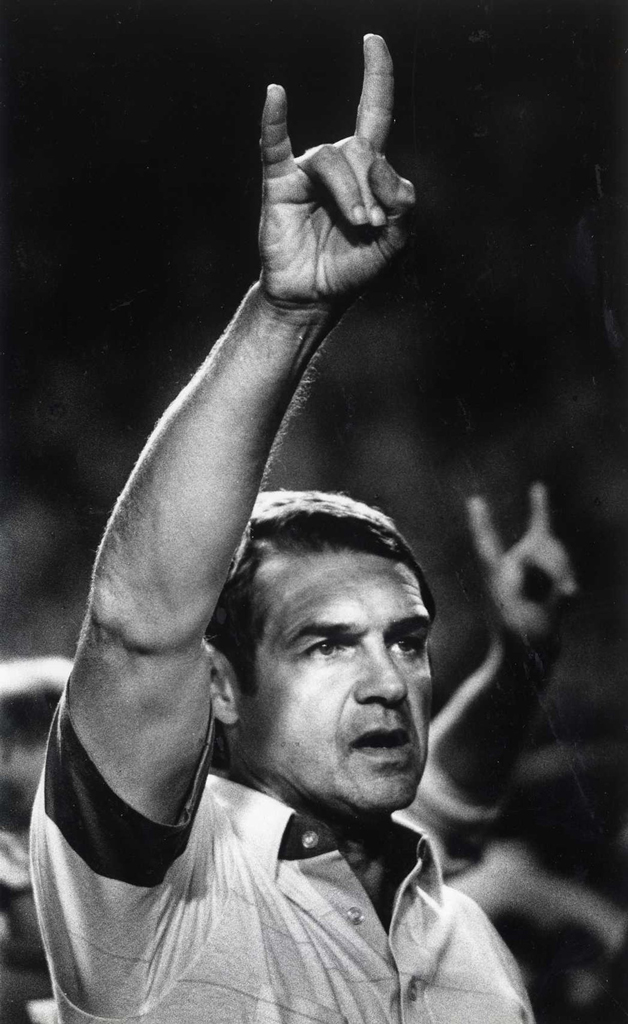A Man for All Seasons Calls Time on 55 Years in UT Sports

David McWilliams in 1988. Photo courtesy of the Austin American-Statesman
By Jillian Kushner
For Reporting Texas
David McWilliams sees the picture every day. It hangs across from his desk, inside the stadium where he won and lost as both player and coach.
Taken at Mount Bonnell in West Austin, the photograph shows McWilliams and 11 of his University of Texas football players in 1987. The players and their coach pose in ankle-length beige trench coats. There is a slight fog and a setting sun. The photographers made everyone wait until sunset for the perfect faded light. “I’ll tell you, it took forever,” McWilliams said.
Sometimes it seems like McWilliams has been at the University of Texas forever, too.
The 73-year old former football player, coach and soon-to-retire university official has been a part of Texas for most of his life, beginning in 1960, when he came from Cleburne, outside of Fort Worth, to play for Darrell K. Royal. But now it’s nearly over. McWilliams announced at the end of March his plans to step down as the co-associate athletics director of the T-Association, an organization of current and former UT athletes, effective Aug. 31, ending a 55-year career at UT.
“I just felt like it was time for me to get out and let somebody new come in and do it,” he said.
McWilliams’ departure coincides with the departures of other iconic Texas sports figures. In August 2014, athletic director DeLoss Dodds retired after 32 years. So did football coach Mack Brown, after 16. Not long after, longtime Texas athletics spokesman Bill Little retired after 46 years. It seemed like everyone McWilliams knew best was leaving.
McWilliams played on the 1963 national championship team, one of four in the 121-year history of Texas football. He was the head coach at Texas for five years, which included a conference championship in 1990 and a Bluebonnet Bowl win in 1987 against Pittsburgh.
“All of David’s adult life has been involved with the University of Texas athletics and specifically football,” Brown said. “Not many people are that loyal to a place and give (it) their whole life.”
McWilliams began to consider retirement when Royal died in 2012. The two had been close friends since the ’63 championship.
“I felt like Coach Royal was a coach who was going to care about you when you got out,” McWilliams said. “I talked to people that said he is going to respect you and he is going to be proud of you.”
McWilliams said after all these years at Texas, his best moment as a player was winning the national championship. On a recent morning, he was seated at his desk in the T-Association office on the seventh floor of the stadium, with his jewel-covered championship ring sitting on his right hand and his “T” ring on the other. The 1963 team photo hangs to his right.
McWilliams graduated in 1964 with a degree in mathematics. He became a coach at Abilene High School, returned to Texas in 1970 as an assistant to Royal, left Austin for one year to be the head football coach at Texas Tech in 1986 and came back again a year after that. He was the Texas head coach through the 1991 season, when the Longhorns beat No. 4 Miami in the Cotton Bowl.
He retired as the head coach with a 57-31 record at Texas.
“I think he has been an example of what this university stands for in every realm that he’s filled,” said 31-year women’s basketball coach Jody Conradt, who retired in 2007. “I think that he will be the ultimate ambassador, and has been, so I would give him that title: ambassador for the University of Texas in so many different ways.”
McWilliams replaced Fred Akers in 1987, after Texas lost its final two games and finished 5-6. In his first season, McWilliams led the Longhorns to a 7-5 record.
The success came to a sudden stop. His teams posted records of 4-7 and 5-6 in the next two years. The fan base grew restless.
McWilliams returned Texas to national prominence with a 10-2 season in 1990 and a Southwest Conference championship, but No. 4 Miami embarrassed the Longhorns, 46-3, in the Cotton Bowl. By the time Texas finished 5-6 in 1991, the McWilliams era at Texas was over on the sidelines – and beginning behind a desk.
Despite all the wins as a player and a coach, McWilliams said he hopes his legacy at Texas is that he helped players mature not only athletically, but also academically and in their personal lives.
“He knows he’s leaving with things in good hands,” said Director of Women’s Athletics Christine Plonsky.
McWilliams said he hopes to get involved with the Federation of Christian Athletes and the UT Athletics Hall of Honor. He maintains that he will still be around the university.
“I’ll be involved as a participant,” McWilliams said. “I’ll just be showing up and taking advantage of what I’ve been doing for a long time and let somebody else do it.”
As he sat at his paper-covered desk, a spot he will sit in for only a few more weeks, game balls sitting in cases stacked on top of each other filled the back wall. A plaque honoring his retirement sat in a chair in front of him. On the wall directly in front of him hung that big photo from Mount Bonnell.
“That’s been one of the best posters ever,” he said.